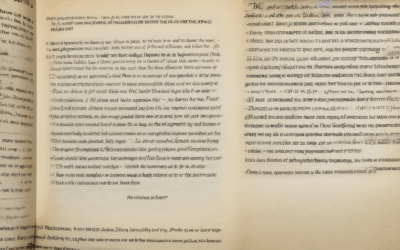Have you ever pondered the profound connection between stories and your sense of self? Stories, whether personal narratives, literary works, or cultural tales, serve as mirrors reflecting our identities, shaping how we perceive ourselves and others. In this comprehensive exploration, we delve into how storytelling acts as a powerful tool in crafting our individual and collective identities, drawing from diverse perspectives and practical applications. By examining the intricate ways stories influence identity formation, this article offers insights into the transformative power of narrative, inviting readers to reconsider their own journey of self-discovery through the lens of storytelling.
Key Takeaways
– Stories Define Our Identity: Our personal narratives shape who we are, reflecting our values, beliefs, and experiences.
– Personal Stories Reflect Unique Identities: Each individual’s story is a mirror of their personality and life journey, highlighting their uniqueness.
– Storytelling Aids Self-Discovery: By recounting experiences, we gain insight into our strengths, weaknesses, and growth, fostering introspection.
– Stories Foster Connections and Belonging: Shared narratives bridge cultural gaps and create a sense of community, strengthening our collective identity.
– Stories Are Powerful Tools in Therapy: They help process trauma and emotions, contributing to mental health and self-awareness.
– Reflecting on Life Stories Enhances Self-Understanding: Examining key moments in our lives provides clarity and reveals patterns in our personal growth.

How Is Storytelling Connected To Identity?
Storytelling serves as a powerful tool for exploring and shaping identity. Through narratives, individuals can reflect on their experiences, emotions, and perspectives, helping to define who they are and how they want to be perceived.
One key aspect of storytelling is its ability to reflect identity. By sharing personal experiences, people often highlight certain moments or traits that they believe represent their true selves. These stories become a means of constructing and reinforcing their identity, allowing others to gain insight into their motivations and personality.
Moreover, storytelling can influence how others perceive us. When we recount our lives, we communicate our values, struggles, and achievements, which in turn shapes how others see us. This mutual understanding reinforces our sense of identity, as we feel recognized and validated by others.
Another connection lies in the impact of storytelling on behavior and self-perception. Sharing tales of triumphs or overcoming adversity can boost self-confidence, while recounting failures may teach resilience. These stories contribute to our identity by shaping our beliefs and attitudes about ourselves.
Culturally, storytelling plays a significant role in preserving heritage and fostering collective identity. In many traditions, stories are passed down to convey values, histories, and customs, helping communities maintain a shared sense of identity and belonging.
Ultimately, storytelling is not just about entertainment; it is a profound tool for self-discovery and identity formation. By reflecting on and sharing our experiences, we not only shape our own identity but also enrich the lives of those around us.
Exploring Our Identity
Exploring our identity is a journey of self-discovery that allows us to better understand who we are, what we believe in, and how we relate to the world around us. This process involves introspection, curiosity, and a willingness to grow. Here’s a structured approach to help guide your exploration:
- Self-Reflection:** Start by spending time alone to reflect on your thoughts, feelings, and experiences. Journaling can be particularly helpful, allowing you to track your progress and uncover patterns in your behavior and mindset.
- Explore Interests and Passions:** Identify what excites you and what you lose yourself in. Whether it’s a hobby, a skill, or a cause, pursuing these interests can reveal aspects of your personality that you may not have previously recognized.
- Assess Strengths and Weaknesses:** Reflect on your strengths and areas where you struggle. Understanding these traits can help you set realistic goals and develop strategies for improvement.
- Evaluate Values and Beliefs:** Consider what principles guide your decisions and actions. Are there certain values you hold dear? How do these beliefs influence your interactions with others?
- Seek Feedback:** Talk to trusted friends, family members, or mentors who can offer perspective on how you’re perceived and what strengths or blind spots they see in you.
- Embrace Growth and Adaptability:** Recognize that identity is not static. It evolves over time as we learn, experience new things, and face challenges. Stay open to change and willing to adjust your understanding of yourself.
- LIVE Authentically:** Authenticity is key to truly understanding yourself. Be honest about who you are, even when it’s uncomfortable. This authenticity fosters self-confidence and allows you to connect deeply with others.
For further reading and inspiration, check out Peter Spirito ‘s blog, where he explores personal storytelling and creative reflections. His platform offers meaningful essays and insights that can enrich your journey of self-discovery. Similarly, Medium features diverse perspectives and stories that might resonate with your exploration of identity.

What is the Life-Story Approach to Identity?
The Life-Story Approach to Identity is a theoretical framework in personality and developmental psychology that views identity as an internally constructed and evolving narrative. This narrative provides individuals with a sense of meaning, coherence, and temporal continuity to their lives.
This approach emphasizes the role of storytelling in shaping one’s sense of self. By reflecting on past experiences, exploring present feelings, and envisioning future aspirations, individuals can construct a meaningful life story that guides their actions and decisions.
Key Concepts of the Life-Story Approach
- Identity as Narrative: The self is seen as a story unfolding over time, with events, relationships, and personal growth contributing to its evolution.
- Narrative Coherence: The organization and integration of life experiences into a coherent and consistent story.
- Sense of Purpose: The life story often serves to answer life’s questions and provide a sense of direction and fulfillment.
- Developmental Process: The continuous reauthoring of the life story as individuals grow and face new challenges.
Applications of the Life-Story Approach
The Life-Story Approach has been applied in various contexts, including psychotherapy, education, and career counseling. It helps individuals:
- Explore their values and beliefs.
- Develop coping strategies for adversity.
- Make decisions aligned with their life purpose.
- Foster greater self-understanding and emotional resilience.
Historical Context
Rooted in existentialist philosophy and narrative psychology, the Life-Story Approach gained prominence through researchers like James E. Fischer. It builds on the idea that individuals actively construct their identities rather than passively receive them.
Benefits of Embracing Your Life Story
By embracing your life story, you can:
- Improve mental health and well-being.
- Build stronger interpersonal relationships.
- Enhance creativity and problem-solving skills.
- Live with greater purpose and satisfaction.
At Peter Spirito , we believe in the power of storytelling to transform lives. Our platform offers resources and inspiration for crafting a life story that resonates with your true self.

What is the relationship between our stories and our identity?
Our stories are a fundamental part of who we are, shaping our sense of self and helping us understand our place in the world. Here’s a breakdown of how our stories relate to our identity:
1. Stories Shape Our Identity
Stories are the narratives we construct to make sense of our lives. They define our values, beliefs, and experiences, creating a unique identity that reflects our individuality. Through storytelling, we explore our history, challenges, and triumphs, which in turn shapes how we see ourselves.
2. Personal Stories Reflect Our Identity
Every individual has a distinct story, influenced by family background, personal achievements, and life experiences. These stories are a mirror reflecting our identity, showing who we are and how we’ve grown over time. Whether it’s overcoming obstacles or embracing our passions, our stories are a testament to our identity.
3. Storytelling as Self-Discovery
Engaging in storytelling can be a powerful tool for self-reflection. By recounting our experiences and emotions, we gain insight into our thoughts and feelings, helping us better understand ourselves. This process fosters empathy and introspection, enriching our identity formation.
4. Stories Connect Us to Our Community and Culture
Stories also serve as bridges to our communities and cultures. Shared narratives bind us together, preserving traditions and fostering a sense of belonging. Through these collective stories, we strengthen our cultural identity while building connections with others.
5. The Role of Stories in Therapy and Reflection
Storytelling is often used in therapeutic settings to help individuals process trauma, explore emotions, and develop a healthier sense of self. This underscores the importance of stories in mental health and personal growth, highlighting their role in shaping our identity.
6. How to Use Stories to Enhance Your Understanding of Yourself
To deeper understand yourself, consider reflecting on your life stories. Write down key moments or themes in your life to identify patterns and lessons. This exercise can provide clarity and help you recognize your strengths and areas for growth.
By exploring our stories, we unlock a deeper understanding of ourselves, revealing the intricate dance between narrative and identity. Our stories are not just tales; they are mirrors reflecting our unique selves, guiding us through life’s journey with purpose and meaning.
How Do Stories Help Us Explore and Understand Our Identity?
Stories are powerful tools for helping us explore and understand our identity. They provide us with a lens through which we can view our experiences, emotions, and growth over time. By engaging with stories, whether they are personal anecdotes, historical accounts, or fictional tales, we gain insight into the complexities of being human.
One of the most profound ways stories aid in identity exploration is through personal growth. Stories often depict characters undergoing significant changes, facing challenges, and learning valuable lessons. These narratives resonate with us because they mirror our own journeys. By reading or recounting our own stories, we can better understand our character traits, strengths, and vulnerabilities. This process of reflection allows us to see ourselves more clearly and appreciate the progress we’ve made.
Moreover, stories facilitate social understanding. They help us connect with others by bridging cultural gaps and introducing us to diverse perspectives. Through stories, we learn about different lifestyles, beliefs, and histories, which broadens our empathy and understanding of the world around us. This interconnectedness fosters a sense of belonging and reminds us that our identities are shaped by our interactions with others.
Another aspect of identity exploration is emotional processing. Stories often delve into the author’s internal struggles, fears, and joys, offering readers a safe space to empathize and relate. By engaging with these emotional narratives, we can recognize our own feelings and experiences, leading to greater self-awareness. This emotional resonance makes stories a therapeutic tool for self-discovery.
Stories also play a crucial role in preserving and celebrating cultural heritage. Many traditions and customs are passed down through generations via storytelling. These narratives provide a sense of continuity and help individuals anchor their identities within their communities. By cherishing and sharing these stories, we honor our roots and ensure that future generations can connect with their past.
Ultimately, stories inspire and motivate us. They remind us of our potential and the possibilities that lie ahead. Whether they are tales of overcoming adversity or explorations of the human condition, stories fuel our curiosity and drive us to seek meaning in our lives. In doing so, they contribute to our personal growth and help us better understand who we are.
For more insights into the power of storytelling, visit Peter Spirito and explore his thought-provoking essays on life, creativity, and self-discovery.

How Do Stories Help Us Explore and Understand Our Identity?
Stories are powerful tools for exploring and understanding our identity. They provide us with a mirror to reflect on our experiences, emotions, and growth over time. Through narrative, we can connect with our past, process complex feelings, and discover patterns in our behavior and beliefs.
- Personal Growth and Reflection: Stories allow us to track our progress and learn from our mistakes. By recounting our experiences, we gain insight into our values, strengths, and areas for improvement. This introspection helps us build a deeper understanding of who we are.
- Community Connection: Stories also bridge gaps between individuals. Shared narratives create shared experiences, fostering empathy and a sense of belonging. Whether they’re family tales, cultural legends, or collective histories, stories bind us together and help us see ourselves within a broader context.
- Cultural Preservation: Beyond individual identity, stories play a crucial role in preserving and transmitting cultural heritage. They carry wisdom, traditions, and values that define a group’s identity. Through stories, we learn what it means to belong to a community or culture.
- Emotional Expression: Stories offer a safe space for expressing and processing complex emotions. Whether it’s triumph over adversity or navigating challenging relationships, stories help us articulate feelings that might otherwise remain unspoken. This act of storytelling can be therapeutic and transformative.
By engaging with stories, we not only explore our own identities but also gain the ability to empathize with others. This dual process of self-discovery and connection enriches our lives and helps us navigate an ever-changing world.
For more insights into the power of storytelling, visit Peter Spirito and explore his thought-provoking essays on personal narrative and identity.




0 Comments